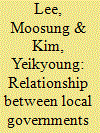| Srl | Item |
| 1 |
ID:
121738


|
|
|
|
|
| Publication |
2013.
|
| Summary/Abstract |
We attribute the negative perceptions between South Korea and China to the absence of real argumentative interaction. Argumentative interaction is a social process that seeks mutual understanding through persuasive and noncoercive action. The argumentative process helps state actors to minimize their negative perceptions and to reach mutual understanding-an evolutionary process that leads to perceptional change. In the case of South Korea and China, two conditions are known to instigate arguing: uncertainty and conscious efforts by both actors. The governments and elites of both states should take significant roles in seeking policy alternatives and in building a healthy cyberspace.
|
|
|
|
|
|
|
|
|
|
|
|
|
|
|
|
| 2 |
ID:
112431


|
|
|
| 3 |
ID:
131268


|
|
|
| 4 |
ID:
169150


|
|
|
|
|
| Summary/Abstract |
Despite 25 years of unprecedentedly friendly ties between South Korea and
China, the Terminal High Altitude Area Defense (THAAD) disputes and China’s
ensuing sanctions against South Korea have forced the bilateral relationship
into an unprecedented standoff. Given South Korea’s growing dependence on
China in economic and North Korean affairs, commentators always assumed
that the South Korean government would “manage” this relationship. China has
maintained a close relationship to keep South Korea within its orbit, restraining
Seoul from further efforts to strengthen the U.S.–South Korean alliance. However,
the Park Geun-hye government’s decision to respond to North Korea’s incessant
provocations by deploying the THAAD system in South Korea caused China to
implement economic retaliation. The ensuing paralysis of bilateral relations has
lasted for over a year. A key problem for the future of the bilateral relationship is
the fact that both countries have lost trust in each other. China views South Korea’s
decision to deploy THAAD as a betrayal of its support, while South Korea objects
to China’s relentless economic bullying. Consequently, post–THAAD South Korea–
China relations are likely to reflect South Korea’s efforts to reduce its dependency
on China and to manage its development in a more balanced way.
|
|
|
|
|
|
|
|
|
|
|
|
|
|
|
|
| 5 |
ID:
110794


|
|
|
|
|
| Publication |
2012.
|
| Summary/Abstract |
This paper discusses the national security challenges and policy dilemmas that
South Korea is predicted to face in the year 2012. North Korea is currently
engrossed in efforts for stabilization of its new regime led by Kim Jong Un. It is
expected that for the time being the two Koreas will seek signals to help facilitate
a shift in the bilateral situation amid the continuing tense situation. Meanwhile,
there remains a high possibility of recurrence of a crisis situation on the Korean
peninsula due to accumulated internal conflicts and the unproven leadership of
the North's new leader. Concerning the North's nuclear program, it is difficult to
expect it will be settled in the way intended at the time of launching the Six-Party
Talks. Under such circumstances, the international community's interest is
focused on what impact the new defense strategy adopted by the United States,
including the planned cuts in the U.S. defense budget over the next decade, will
have on the security situation in Northeast Asia. China's military buildup based
on its rapid economic development has become one of the main security concerns
for the countries in the region. The strategic dilemma associated with China's
military buildup looms large, particularly for South Korea, because the bilateral
relationship between the two Koreas overlaps with the ROK-U.S. alliance and the
relationship between South Korea and China. The best scenario would be if the
G-2, i.e. the United States and China, are willing to assume their share of responsibilities and capabilities in pending issues facing the international community, but
this could be wishful thinking. The importance of the ROK-U.S. alliance cannot be
overemphasized as long as U.S.-China relations remain one of "checking up on one
another" and confrontation, and there are continued threats from North Korea.
The South is certainly not alone in wishing to see China's development in diverse
sectors, i.e. raised GDP, the establishment of a competitive economic system, key
currency, global standards and military power, and increased responsibility and
capability for coping with security threats.
|
|
|
|
|
|
|
|
|
|
|
|
|
|
|
|